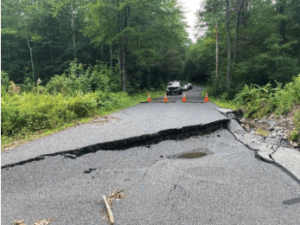Who is a member?
Our members are the local governments of Massachusetts and their elected and appointed leadership.

Damage to a road in Warwick (Franklin County) from a storm in July 2021. (photo courtesy of the Office of Senator Jo Comerford)
A study published today by State Auditor Suzanne Bump concludes that communities in Western Massachusetts have been left without the tools necessary to maintain or develop public roadways, buildings and broadband as a result of a declining population, geographic challenges, and a lack of overall resources.
The study results have led the auditor to call for a Rural Rescue Plan that would increase funding for the Chapter 90 local road and bridge program by 50%, to $300 million annually; create a public infrastructure agency; and continue investments in expanding access to broadband internet.
“As billions of dollars flow from federal relief funding provided by the CARES Act and the American Rescue Plan, now is the time for the Commonwealth to develop a Rural Rescue Plan to create a new future for these cash-strapped communities,” Bump said. “Addressing these public infrastructure challenges now, specifically for transportation, municipal buildings and broadband, will go a long way in terms of enhancing equitable planning and development for generations to come.”
The study, Public Infrastructure in Western Massachusetts: A Critical Need for Regional Investment and Revitalization, produced by the Division of Local Mandates, examined three aspects of public infrastructure in Western Massachusetts: roadways, culverts and bridges; municipal buildings such as town halls, police stations and public works buildings; and broadband internet.
Through a survey of municipal officials in the state’s four western-most counties – Berkshire, Franklin, Hampden and Hampshire – the study contends that the region has suffered from an overall state government policy focus on more urban areas.
Roadways, bridges and culverts
The report finds that the maintenance of roads, bridges and culverts is a significant issue facing Western Massachusetts, where much of this infrastructure is in a state of disrepair. The recommendations include an endorsement of the MMA’s long-standing request to increase annual Chapter 90 funding to at least $300 million. The auditor’s office also calls for a revision to the distribution formula, which, the report asserts, favors more populated areas of the state, a disparity that has led to crumbling roadways and development challenges in Western Massachusetts.
Additionally, the auditor argues that the state’s Small Town Road Assistance Program, part of the MassWorks Infrastructure Program, should be restructured to better support the state’s smaller towns. In fiscal 2020, communities in Western Massachusetts accounted for 65% of the STRAP applications, but only five projects ended up receiving awards.
Public buildings
For years, many Western Massachusetts communities have had to deal with inadequate and dilapidated municipal buildings due to a lack of resources. The study estimates that it could cost as much as $40.7 million annually to maintain or renovate the region’s public safety facilities alone, and approximately $30.3 million in annual expenditures for repair and renovation of public works facilities throughout Western Massachusetts.
The study notes that many smaller towns do not have the staff to draw up the proposals and submit applications for funding from competitive grant programs, which “severely restricts” the ability of Western Massachusetts municipalities to invest in and develop public infrastructure.
To lessen this burden, the study recommends that the Legislature establish an agency with a dedicated source of revenue that is devoted to the creation and reparation of public infrastructure in underserved areas, modeled after the Massachusetts School Building Authority. This agency would also have a department that provides planners and engineers to local communities to assist in the design of projects and application for funding for critical infrastructure needs.
Broadband internet
Lack of reliable access to broadband internet and generally slower internet speeds have severely disadvantaged communities, businesses and residents throughout Western Massachusetts, the report finds. The Commonwealth’s average advertised internet download speed is 191.2mbps, but the speeds are significantly slower among Western Massachusetts communities. In Franklin County, for example, the average speed is only 109.7, well below the statewide average.
The state’s initiative through the Massachusetts Broadband Institute has made progress, the report states, but there is still a long way to go in ensuring that all communities have equal access to reliable internet. The study calls on the state to continue its collaborative work with networks to bring broadband to areas that don’t already have access and to lower costs for customers.
“This study from the Auditor’s Office draws attention to significant and time-sensitive challenges for many small towns in western Massachusetts,” said Charlemont Town Administrator Sarah Reynolds. “Due to the lack of resources, communities here have to choose which public infrastructure problem to address based on available funding, or lack thereof. The recommendations and next steps laid out in today’s study would give municipalities a better means to help get much-needed infrastructure projects done without being financially underwater.”
In addition to responding to requests from local governments about potential unfunded mandates, the Division of Local Mandates also produces Municipal Impact Studies, such as this one, that provide an analysis of aspects of state law that have significant fiscal impacts on municipalities.